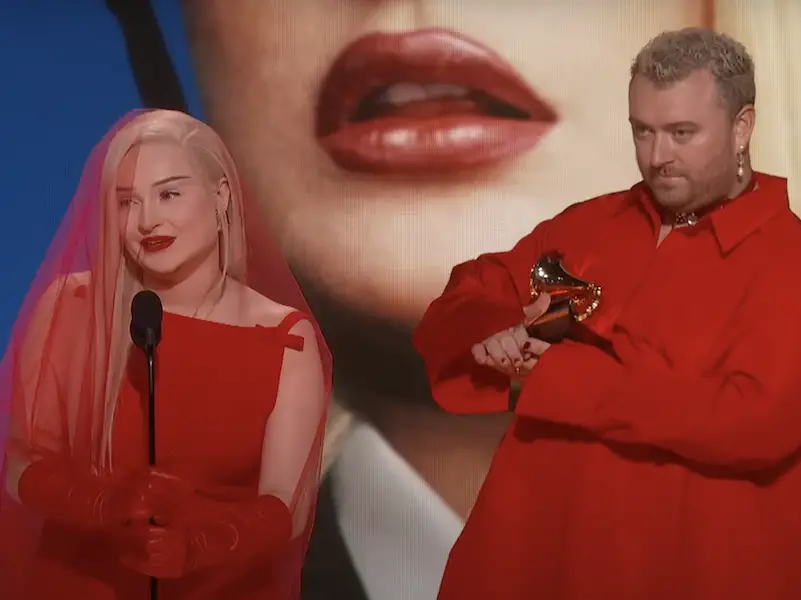During music’s biggest night of the year, winners and performers of the 65th annual Grammy Awards provided the most diverse representation seen in years. Many of the industry’s biggest names, including Beyonce, Adele and Bad Bunny, had front-row seats for notable wins at Los Angeles’ Crypto.com Arena on Feb. 6. Still, the results showed that the Grammy Awards have a long way to go when it comes to recognizing diverse talent.
In a historic win, Kim Petras and Sam Smith received the award for best pop duo/group performance for their platinum-certified single “Unholy.” They are the first LGBTQ+ music duo to win the award, and they were also the second LGBTQ+ musicians to receive the Grammy in the award’s eleven-year run, as Lil Nas X received the award in 2020 for “Old Town Road” with Billy Ray Cyrus. Notably, Petras is the first openly transgender musician to win an award in this category; in her speech, she thanked Madonna for “fighting for LGBTQ+ rights.” Smith is the first nonbinary artist to win the award for best pop duo/group performance. Previously, Smith was nominated for “In The Lonely Hour” in 2015; their single “Stay With Me” went on to win song of the year.
Beyonce broke the record for the most decorated Grammy winner in history. With 33 wins, she surpassed the late conductor Georg Solti, who won his last award in 1997. Her album “Lemonade,” critically acclaimed for its raw portrayal of Black womanhood, won best urban album, sparking controversy about the lack of Black female musicians to have been awarded album of the year. Beyonce’s achievement served as a win after fans and critics dubbed her 2017 Grammy Award loss for “Lemonade” a snub after Beck won for his album “Morning Phase.”
In addition to Beyonce, many other Black female artists shined during this year’s broadcast. The winners included Lizzo for record of the year, Samara Joy for best new artist and best jazz vocal album and Viola Davis for best audio book, narration and storytelling recording. Additionally, Davis became the third Black woman to join the highly respected EGOT club, which consists of people who have won at least an Emmy, a Grammy, an Oscar and a Tony. In a star-studded performance, hip hop artists Queen Latifah, Missy Elliott and Salt-N-Pepa performed some of their biggest hits, including “My Mic Sounds Nice,” “Lose Control” and “U.N.I.T.Y.” respectively. Latifah ended her performance with encouraging words for aspiring female rappers; “Don’t be a pawn, control your career, speak from the heart, say what you want to say, represent us and let’s go,” Latifah said. “Let’s get this.”
Additionally, the Grammys’ newest award category, best song for social change, further signified a move toward progress. Iranian singer-songwriter Shervin Hajipour won the award for his song “Baraye,” which protested the death of Mahsa Amini, a woman killed in Sept. 2022 while in police custody. Hajipour was arrested and later released for sharing the song. Other nominees included John Legend’s “FREE” and Lil Baby’s “The Bigger Picture.” A Blue Ribbon Committee judged the category, which was ratified by the Recording Academy’s board of trustees. First Lady of the United States Jill Biden introduced the Special Merit Award, which is “now one of the highest honors a socially conscious song can receive,” according to the Grammy website. “Shervin was arrested, but this song continues to resonate around the world with its powerful theme: women, life, freedom,” Biden told the crowd.
Despite a night of groundbreaking achievements, the Grammys still snubbed fan favorites for album of the year. For the fourth time, Beyonce lost the award, sending many fans to question the Grammys’ reluctance to award album of the year to a Black artist. No Black female artist has won the award since Lauryn Hill in 1999, although 11 Black female artists have been nominated. Beyonce holds four nominations in different years. The results are similar for Black men. Jon Batiste won Album of the Year for “We Are” during the 64th Annual Grammy Awards in 2022, closing a 14-year gap between previous winner Herbie Hancock for “River: The Joni Letters.” Many viewers believe that the Recording Academy purposely snubs Black talent; major artists such as John Legend have echoed this theory.
Beyonce’s highly acclaimed album “Lemonade” lost album of the year to Adele’s “25” at the 59th annual Grammy Awards. During her acceptance speech, Adele stated that Beyonce should have won for her “monumental, and so well thought out and so beautiful and soul-baring” album.
Despite breaking the record for global pre-ads in Apple music, The Weeknd’s album “After Hours” did not receive a nomination in any category during the 63rd Annual Grammy Awards; in response, The Weeknd permanently boycotted the Grammy Awards. “The trust has been broken for so long between the Grammy organization and artists that it would be unwise to raise a victory flag,” The Weeknd told Variety.
Undoubtedly, each nominee for album of the year qualifies to win the award; the honor of a nomination is a massive achievement. Yet fans naturally start to examine why highly acclaimed and platinum-selling albums such as “Lemonade” and “After Hours” fail to garner adequate recognition.
For example, Harry Styles’ win for “Harry’s House” was met with criticism from music fans, mirroring the 57th Grammy album of the year controversy between Beyonce and Beck. Released in May 2022, the album earned 330,000 album sales, the highest number of first-week sales made by a male artist in two years. Styles co-wrote all 13 songs on the album, reminiscent of Beck, who wrote every song on “Morning Glory.” Beyonce’s “Lemonade” featured songs with at least three to four co-writers; for “Renaissance,” the number of contributors increased to no less than six. The Recording Academy seems to award artists for holistic involvement in the creation of an album — songwriting, producing, recording — and rarely bases their decision on the general public’s perception.
Beyonce’s recurrent losses are not her fault, just as Styles’ win is not his. Instead of adhering to The Recording Academy’s rules, Beyonce has achieved something that the Grammys are working on perfecting. With over ten Black artists credited as co-writers on the 16-track album — including notable names like Pharrell Williams, Shawn Carter and Raphael Saadiq—Beyonce’s album is a success not only for her but for every Black creative who contributed to it. Her seventh studio album “Renaissance” provided exposure to many smaller up-and-coming Black songwriters, such as Nija Charles and Leven Kali, who received their first Grammy nominations for song of the year.
We cannot ignore these small wins over battles that may not be worth winning if they sacrifice Black creatives and their work. Beyonce may never win album of the year so long as the Academy values an artist’s engagement over their pop cultural influence, but she can provide opportunities to Black talent in ways that the Grammys cannot. The Grammys have some catching up to do, but this year was a much-needed start.
















